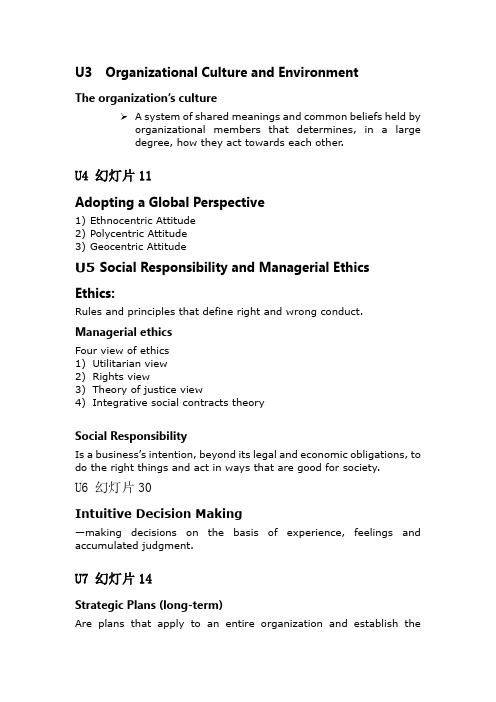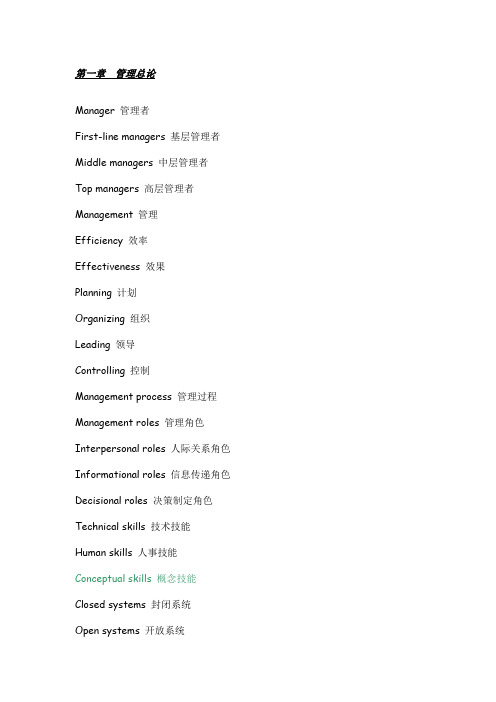管理学 群体思维 英文版
- 格式:pptx
- 大小:2.34 MB
- 文档页数:13



大一管理学知识点英文Management Knowledge Points in Freshman YearIntroduction:In the first year of college, students majoring in management are introduced to various fundamental concepts and principles in the field. These knowledge points form the foundation for future studies and provide a broad understanding of management principles and practices. This article aims to highlight some key management concepts that are typically covered in a freshman year management curriculum.1. Organizational Behavior:Organizational behavior is the study of how individuals and groups behave within an organization. It explores topics such as motivation, leadership, communication, and decision-making. By understanding human behavior in the workplace, managers can create a more productive and positive organizational culture.2. Principles of Marketing:Marketing principles focus on the process of creating, communicating, delivering, and exchanging value offerings to target customers. Students learn about market research, consumer behavior,product development, pricing strategies, and promotional activities. These concepts aid in understanding market dynamics and developing effective marketing strategies.3. Financial Accounting:Financial accounting is an essential aspect of management. Students learn how to prepare financial statements, analyze financial data, and interpret financial reports. This knowledge allows managers to make informed decisions, evaluate organizational performance, and communicate effectively with stakeholders.4. Microeconomics:Microeconomics deals with the analysis of individual economic agents such as consumers, firms, and markets. Students study concepts like supply and demand, market equilibrium, production, costs, and market structures. This helps managers understand how price and quantity decisions are made and how market forces impact business operations.5. Business Communication:Effective communication is crucial within any organization. Students learn how to communicate professionally through variouschannels such as oral presentations, written reports, and interpersonal interactions. Emphasis is placed on improving communication skills, including active listening, clarity, and persuasion.6. Operations Management:Operations management focuses on the design, planning, and control of production processes and operations within an organization. Students learn about supply chain management, quality control, capacity planning, and inventory management. This knowledge ensures efficient utilization of resources and enhanced productivity.7. Business Ethics:Ethics play a vital role in management decision-making. Students explore ethical theories and principles, analyze ethical dilemmas, and learn how to make ethical choices in business contexts. Understanding business ethics is essential for building trust, maintaining reputation, and making responsible managerial decisions.8. Strategic Management:Strategic management involves formulating and implementing long-term goals and initiatives to achieve organizational objectives. Students learn how to analyze the external environment, assess internalcapabilities, and develop strategic plans. This knowledge enables managers to anticipate future challenges, adapt to changes, and seize opportunities.Conclusion:The knowledge points discussed above provide a solid foundation for students pursuing a management degree in their freshman year. These concepts encompass various aspects of management, including organizational behavior, marketing, accounting, economics, communication, operations, ethics, and strategic planning. Mastering these knowledge points in the early stage of education will prepare students for advanced courses and future managerial roles.。

U3 Organizational Culture and EnvironmentThe organization’s culture➢ A system of shared meanings and common beliefs held by organizational members that determines, in a largedegree, how they act towards each other.U4 幻灯片11Adopting a Global Perspective1)Ethnocentric Attitude2)Polycentric Attitude3)Geocentric AttitudeU5 Social Responsibility and Managerial Ethics Ethics:Rules and principles that define right and wrong conduct. Managerial ethicsFour view of ethics1)Utilitarian view2)Rights view3)Theory of justice view4)Integrative social contracts theorySocial ResponsibilityIs a business’s intention, beyond its legal and economic obligations, to do the right things and act in ways that are good for society.U6 幻灯片30Intuitive Decision Making—making decisions on the basis of experience, feelings and accumulated judgment.U7 幻灯片14Strategic Plans (long-term)Are plans that apply to an entire organization and establish theorganization’s overall goals.S-stress W-witness O-Opportunity T-threatU9 幻灯片47Network Organization—A small core organization that outsources its major business functions (e.g., manufacturing) in order to concentrate what it does best.U11Team(团队)—A group whose members work intensely on a specific common goal using their positive synergy, individual and mutual accountability, and complementary skills.Group(群体)—Two or more interacting and interdependent individuals who come together to achieve specific goals.U12Creativity—The ability to combine ideas in a unique way or to make an unusual association.Innovation—Turning the outcomes of the creative process into useful products, services, or work methods.U13 幻灯片9Jobs satisfaction—The individual’s general attitudetoward his or her jobOrganizational citizenship Behavior(OCB)—Discretionary behavior that is not a part of an employee’s formal job requirements, but which promotes the effective functioning of the organization.U14Communication—The transfer and understanding of meaning.U15Motivation—Is the process by which a person’s efforts are energized , directed, And sustained towards attaining a goal.U16Leadership•Leader –Someone who can influence others and who has managerial authority•Leadership –What leaders do; the process of influencing a group to achieve goals•Ideally, all managers should be leaders•Although groups may have informal leaders who emerge, those are not the leaders we’re studyingU17 幻灯片25Feedforward ControlA control that prevents anticipated problems before actual occurrences of the problem.Concurrent ControlA control that takes place while the monitored activity is in progress.U18Value Chain ManagementThe process of managing the entire sequence of integrated activities and information about product flows along the entire value chain.。


第一章管理总论Manager 管理者First-line managers 基层管理者Middle managers 中层管理者Top managers 高层管理者Management 管理Efficiency 效率Effectiveness 效果Planning 计划Organizing 组织Leading 领导Controlling 控制Management process 管理过程Management roles 管理角色Interpersonal roles 人际关系角色Informational roles 信息传递角色Decisional roles 决策制定角色Technical skills 技术技能Human skills 人事技能Conceptual skills 概念技能Closed systems 封闭系统Open systems 开放系统Special environment 具体环境General environment 一般环境Contingency perspective 权变观Universality of management 管理的普遍性Nonmanagerial employees / Operatives 操作者第二章管理的历史Division of labor 劳动分工Industrial revolution 产业革命Scientific management 科学管理Therbligs 基本动作元素General administrative theorists 一般行政管理理论家Principles of management 管理原则Bureaucracy 官僚行政组织、层级组织Quantitative approach 定量方法Organizational behavior (OB) 组织行为Hawthorne Studies 霍桑研究Workforce diversity 员工多样化Entrepreneurship 企业家e-business (electronic business) 电子商务e-commerce (electronic commerce) 电子贸易、电子商务Total quality management (TQM) 全面质量管理Learning organization 学习型组织Knowledge management 知识管理Workplace spirituality 团队精神第三章计划Decision-making process 决策过程Decision criteria 决策标准Implementation 实施Rational decision making 理性决策Bounded rationality 有限理性Satisficing 满意Escalation of commitment 承诺升级Intuitive decision making 直觉决策Well-structured problems 结构良好问题Programmed decision 程序化决策Procedure 程序Rule 规则Policy 政策Poorly structured problems 结构不良问题Nonprogrammed decisions 非程序化决策Certainty 确定性Risk 风险性Uncertainty 不确定性Directive style 指导性风格Analytic style 分析性风格Conceptual style 概念性风格Behavioral style 行为性风格Strategic plans 战略计划Operational plans 作业计划Long-term plans 长期计划Short-term plans 短期计划Specific plans 具体性计划Directional plans 指导性计划Single-use plan 单一目标计划Standing plans 标准计划Traditional goal setting 传统目标设定Means-ends chain 手段-结果链Management by objectives (MBO) 目标管理Mission 使命Commitment concept 承诺概念Formal planning department 正式计划部门Strategic management 战略管理Strategic management process 战略管理过程Opportunities 机会Threats 威胁Core competencies 核心能力Strengths 优势Weaknesses 劣势SWOT analysis SWOT分析Corporate-level strategy 公司层战略Business-level strategy 事业层战略Stability strategy 稳定战略Growth strategy 增长战略Related diversification 相关领域多元化经营Unrelated diversification 不相关领域多元化经营Retrenchment strategy 收缩战略BCG matrix BCG矩阵波士顿咨询集团矩阵Strategic business units 战略经营单位Competitive advantage 竞争优势Cost leadership strategy 成本领先战略Differentiation strategy 差异化战略Focus strategy 集中化战略Functional-level strategy 职能层战略Environmental Scanning 环境扫描Competitor intelligence 竞争者情报、竞争者信息Forecasts 预测Quantitative forecasting 定量预测Qualitative forecasting 定性预测Forecasting Techniques 预测技术Benchmarking 基准化、标杆Resources 资源Budget 预算Revenue Budgets 收入预算Expense Budgets 费用预算Profit Budgets 利润预算Cash Budgets 现金预算Scheduling 进度计划、规划Gantt Charts 甘特图Load Charts 负荷图PERT network 计划评审技术网络Events 事件Activities 活动Slack time 松弛时间Critical path 关键线路Breakeven analysis 盈亏平衡分析Linear programming 线性规划Project 项目Project Management 项目管理Scenario 设想方案第四章组织Organizing 组织Organizational structure 组织结构Organizational design 组织设计Work specialization 劳动分工Departmentalization 部门化Functional departmentalization 职能部门化Product departmentalization 产品部门化Geographical departmentalization 地区部门化Process departmentalization 过程部门化Customer departmentalization 顾客部门化Cross-functional teams 跨职能团队Chain of command 指挥链Authority 职权Responsibility 职责Unity of command 统一指挥Span of control 管理幅度Centralization 集权化Decentralization 分权化Formalization 正规化Mechanistic organization 机械式组织Organic organization 有机式组织Unit production 单件生产Mass production 大量生产Process production 连续生产Simple structure 简单结构Functional structure 职能型结构Divisional structure 分部型结构Team-based structure 团队结构Matrix structure 矩阵结构Project structure 项目结构Autonomous internal units 内部自治单位Boundaryless organization 无边界组织Learning organization 学习型组织High-performance work practice 高绩效的工作实践Human resource management process 人力资源管理过程Labor union 工会Human resource planning 人力资源规划Job analysis 职务分析Job description 职务说明书Job specification 职务规范Recruitment 招聘Decruitment 解聘Selection process 甄选过程Validity 效度Reliability 信度Work sampling 工作抽样Assessment centers 测评中心Orientation 定向、导向Performance management system 绩效管理系统Written essay 书面描述法Critical incidents 关键事件法Graphic rating scales 评分表法Behaviorally anchored rating scales (BARS) 行为定位评分法Multiperson comparisons 多人比较法Group order ranking 分组排序法Individual ranking 个体排序法Paired comparison 配对比较法360 degree feedback 360度反馈skill-based pay 按技能付酬Career 职业生涯、职业Organizational change 组织变革Change agents 变革推动者Organizational development (OD) 组织发展Stress 压力Creativity 创造Innovation 创新第五章领导Behavior 行为Organizational behavior 组织行为学Attitudes 态度Cognitive component 认知成分Affective component 情感成分Behavioral component 行为成分Job satisfaction 工作满意度Job involvement 工作投入Organizational commitment 组织承诺Organizational citizenship behavior (OCB) 组织公民行为Cognitive dissonance 认知失调Attitude surveys 态度调查Personality 人性Big-five model 重要的五大模型Emotional intelligence (EI) 情感智商Locus of control 控制点Machiavellianism 马基雅维里主义Self-esteem 自尊Self-monitoring 自我监控Perception 知觉Attribution theory 归因理论Fundamental attribution error 基本归因错误Self-serving bias 自我服务偏见Selectivity 有选择地接受、选择性Assumed similarity 假设相似性Stereotyping 刻板印象Learning 学习Operant conditioning 操作性条件反射Social learning theory 社会学习理论Shaping behavior 行为塑造Motivation 动机Need 需要Hierarchy of needs theory 需要层次理论Physiological needs 生理需要Safety needs 安全需要Social needs 社会需要Esteem needs 尊重需要Self-actualization needs 自我实现需要Theory X X理论Theory Y Y理论Motivation-hygiene theory 激励-保健理论Hygiene factors 保健因素Motivators 激励因素Three-needs theory 三种需要理论Need for achievement (nAch) 成就需要Need for power (nPow) 权力需要Need for affiliation (nAff) 归属需要Goal-setting theory 目标设定理论Reinforcement theory 强化理论Reinforcers 强化物Job design 职务设计Job scope 职务范围Job enlargement 职务扩大化Job enrichment 工作丰富化Job depth 职务深度Job characteristic model (JCM) 职务特征模型Skill variety 技能多样性Task identity 任务同一性Task significance 任务重要性Autonomy 自主性Feedback 反馈Equity theory 公平理论Referents 参照对象Expectancy theory 期望理论Compressed workweek 压缩工作周Flexible work hours 弹性工作制Job sharing 职务分担Contingent workers 应急工Telecommuting 电子通信,远程办公Pay-for performance programs 基于绩效的薪酬管理Open-book management 公开帐簿管理Leader 领导者Leadership 领导Behavioral theories 行为理论Autocratic style 权威式Democratic style 民主式Laissez-faire style 放任式Initiating structure 定规维度Consideration 关怀维度High-high leader 高-高型领导者Managerial grid 管理方格论Fiedler contingency model 菲德勒权变模型Least-preferred co-worker (LPC) questionnaire 最难共事者问卷Leader-member relations 领导者-成员关系,上下级关系Task structure 任务结构Position power 职位权力Situational leadership theory (SLT) 情景领导理论Readiness 准备状态Maturity 成熟度Leader participation model 领导者参与模型Path-goal theory 路径-目标理论Transactional leaders 事务型领导者Transformational leaders 变革型领导者Charismatic leader 超凡魅力的领导者Visionary leadership 愿景领导者Legitimate power 法定权Coercive power 强制权Reward power 奖赏权Expert power 专长权Referent power 模范权Credibility 可信度Trust 诚信、信任Empowerment 授权Interpersonal communication 人际沟通Organizational communication 组织沟通Encoding 编码Decoding 解码Channel 通道、渠道Communication process 沟通过程Nonverbal communication 非言语沟通Body language 体态语言Verbal intonation 语调Filtering 过滤Selective perception 选择性知觉Information overload 信息超载Jargon 行话Active listening 积极倾听Formal communication 正式沟通Informal communication 非正式沟通Downward communication 下行沟通、向下交流Upward communication 上行沟通、向上交流Lateral communication 平行沟通、横向交流Diagonal communication 斜行沟通、越级交流Communication networks 沟通网络Grapevine 小道信息、谣言Instant messaging (IM) 即时信息Voice mail 声音邮件Electronic data interchange (EDI) 电子数据交换Tele conferencing 电信会议Video conferencing 视频会议Intranet 内部互联网Extranet 外部互联网第六章控制Control 控制Market control 市场控制Bureaucratic control 官僚组织控制、层级控制Control process 控制过程Management by walking around (MBWA) 走动式管理Range of variation 偏差范围Immediate corrective action 立即纠正行动Basic corrective action 彻底纠正行动Feedforward control 前馈控制Concurrent control 同期控制、现场控制Feedback control 反馈控制。
特别说明,以下笔记版权所有,要外传或转发请知会本人,得到本人允许方可进行!Made by Rae.L管理学原理(Management ) 1.Management:The process of coordinating work activities so that they are completed efficientlyand effectively with and through other people.(同别人一起,或通过别人使活动完成得更有效的过程。
)2.随着企业的扩大,企业必将走向规范化,而不再是纯粹的人情化。
3.Management is the art of getting things done through and with people in formally organized group.Management is the art of removing blocks to such performance.Management is the art of creation an environment in such an organized group where people can perform as individuals and yet cooperate toward …4.Management:Elements of definition(要素):①Efficiency --getting the most output from the least amount of inputs.(以最少的投入得到最大的收入)②Effectively —completing activities so that organizational goals are attained.效果 (管理者完整地实现了组织的目标)*企业越大,风险越大!理念是企业生存的重要要素!!!--“doing the right things ”--concerned with ends △效率可以弥补,但效果却无可挽救!5.Mission 对于一个企业非常重要。
如何管理团队英语作文方便背诵的(中英文实用版)Title: How to Manage a TeamManaging a team is no easy task, it requires a blend of leadership, communication, and strategic thinking.Firstly, establish clear goals and ensure they are understood by every team member.It"s crucial to communicate effectively, fostering an environment where open dialogue is encouraged.管理团队并非易事,这需要领导力、沟通能力和战略思维的有机结合。
首先,要设定明确的团队目标,并确保每位成员都能理解。
有效沟通至关重要,应营造一个鼓励开放对话的环境。
ext, delegate tasks wisely, taking into account individual strengths and weaknesses.Empower your team members, trust them to make decisions, and provide support when needed.Remember, a motivated team is a productive team.其次,要明智地分配任务,考虑到每个人的优势和不足。
赋予团队成员权力,相信他们能做出决策,并在需要时提供支持。
记住,一个有动力的团队是高效的团队。
Conflict is inevitable, but it"s how you handle it that makes the difference.Address issues promptly and fairly, mediating between parties to reach a resolution.Encourage teamwork and collaboration, as these are the cornerstones of a successful team.冲突在所难免,但关键在于你如何处理。
管理学原理英语Management PrinciplesIntroduction to Management PrinciplesManagement principles are a set of fundamental concepts that guide managers in their decision-making processes and actions. These principles are essential for effective management and are applicable in various organizational settings.1. Planning and Goal SettingPlanning involves setting objectives and determining the best course of action to achieve them. Managers should develop a clear vision and define specific goals that align with the organization's overall objectives. They should then formulate strategies, develop plans, and allocate resources to achieve these goals successfully.2. Organizing and CoordinationOrganizing refers to structuring and arranging resources and activities to accomplish organizational goals effectively. Managers need to divide tasks, assign responsibilities, and create a hierarchy of authority. Coordination is crucial to ensure that different individuals and departments work together towards common goals.3. Leading and MotivatingLeadership involves inspiring and guiding individuals and teams to achieve organizational objectives. Effective managers mustpossess strong leadership skills, such as the ability to communicate effectively, provide support, motivate employees, and resolve conflicts. Motivation is essential to encourage employees to perform at their best and contribute to organizational success.4. Controlling and Evaluating PerformanceControlling involves monitoring and evaluating performance to ensure that plans are on track. Managers should establish control mechanisms, such as performance indicators, and regularly assess progress. This allows them to identify deviations and take corrective measures promptly.ConclusionThese management principles provide a framework for managers to make informed decisions and effectively lead organizations. By understanding and applying these principles, managers can enhance productivity, improve employee satisfaction, and achieve long-term success.。